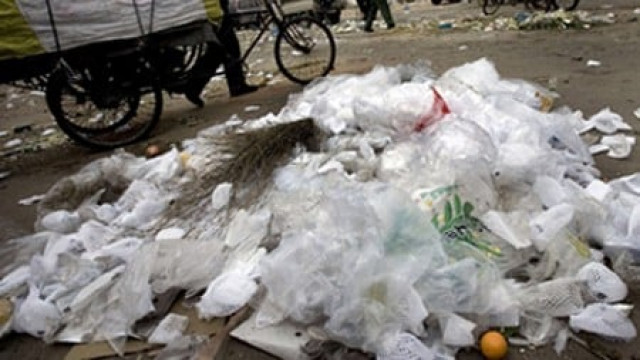Ban on plastic bags from April 1
The replacement costs marginally more, decomposes in months instead of centuries.

At present, the regular plastic bags are sold for Rs85-87 per kilogram (kg) while the oxo biodegradable bags cost around Rs92 per kg. PHOTO: AFP
This is not an April Fools joke.
From April 1, the sale, purchase and use of polythene plastic bags will be completely banned in the Islamabad Capital Territory (ICT).
The Ministry of Law and Justice has notified the Prohibition of Non degradable Plastic Bags (Manufacture, Sale, Use) Regulation 2013. On Thursday, Climate change minister Rana Muhammad Farooq Saeed Khan announced that regular plastic bags will be phased out in the federal capital over the next couple of months.
At the same time, environment friendly oxo biodegradable plastic bags will be introduced, Khan said. He was addressing a press conference at the Ministry of Climate Change.
Plastic bags take centuries to naturally decompose, according to scientific estimates. They present a threat to the environment, not only because they occupy landfills but also because of the emissions resulting from their production. The bags are also known to be dangerous to animals, which might ingest them accidentally.
The text of the plastic bag ban regulation was drafted by the Pakistan-Environmental Protection Agency (Pak-EPA).
Asif Shuja, Pak-EPA’s director general, told The Express Tribune that the oxo biodegradable usually take three to four months to naturally decompose.
He said these bags are already being produced voluntarily by some industry units and some Pakistani companies are also using them in their product packaging.
The production of oxo biodegradable plastic bags does not require a major change of machinery or process, Shuja said.
It involves mixing a small quantity of a petroleum based compound --- or olefin --- with the polyethylene resins. The olefin introduces biodegradation characteristics to the plastic, which are activated when the plastic comes in contact with air. From there on, bacteria can decompose the weak molecular structure of the plastic, Shuja explained.
The cost of this eco-friendly alternative to the retailers is not too high, he said.
At present, the regular plastic bags are sold for Rs85-87 per kilogram (kg) while the oxo biodegradable bags cost around Rs92 per kg.
“Since one kg has around 80 to 100 bags, the cost increase per bag is negligible,” Shuja said.
According to Shuja’s estimates, the cost increase per bag could range between Rs0.05 and Rs 0.50 per plastic bag. Even then, Shuja said, the Pak-EPA has requested the government to remove the 6% export duty on the olefin additive.
“The ban is entirely in favour of human health and we have to support it at any cost,” minister Khan said at the press conference.
The ban will start from Islamabad, but Pak-EPA is trying to get it approved at the provincial level as well.
The climate change ministry has also approached the representatives of the Plastic Bag Manufacturers Association of Pakistan and office bearers of the Karachi and Lahore chambers of commerce to draw their support for a national ban on the use and sale of regular plastic bags, Khan said.
The Pak-EPA will launch a “say NO to plastic bags” campaign to raise awareness about the ban over the next two months in Islamabad. The campaign will include telling shop keepers to place orders for biodegradable plastic bags instead of polythene bags.
The environmental watchdog is also in contact with the Oxo Biodegradable Association of United Kingdom for training and technology transfer.
Shuja said Pakistan’s export industry will also benefit from this step. “Most of our leather and textile exports are packaged in plastic and many foreign countries strictly require environment friendly plastic nowadays,” he said. “If we start using oxo biodegradable plastic, it will send a good signal to the world community and also help our exporters.”
Published in The Express Tribune, February 1st, 2013.



















COMMENTS
Comments are moderated and generally will be posted if they are on-topic and not abusive.
For more information, please see our Comments FAQ